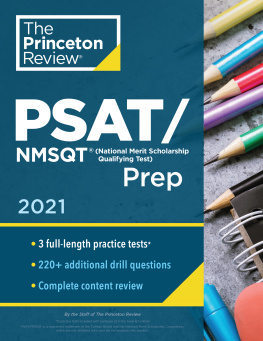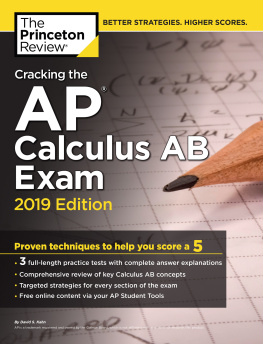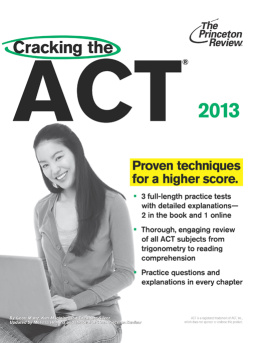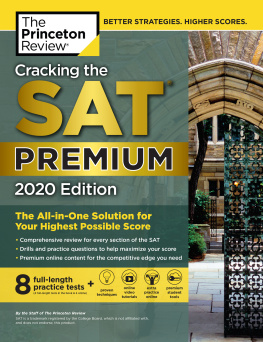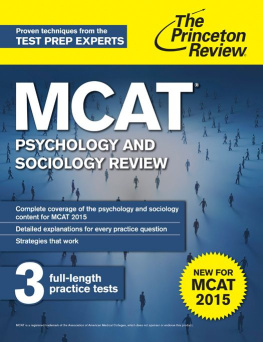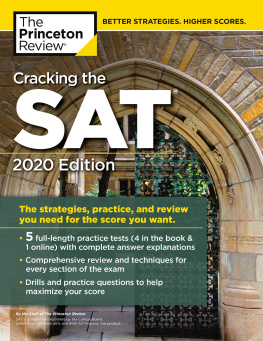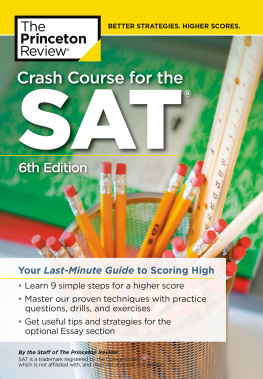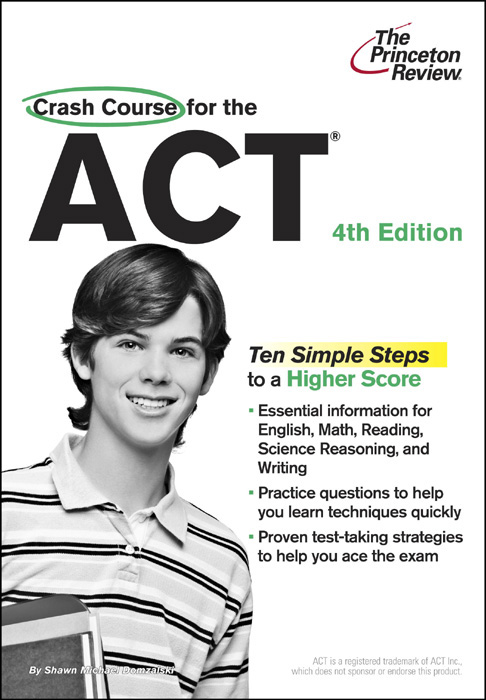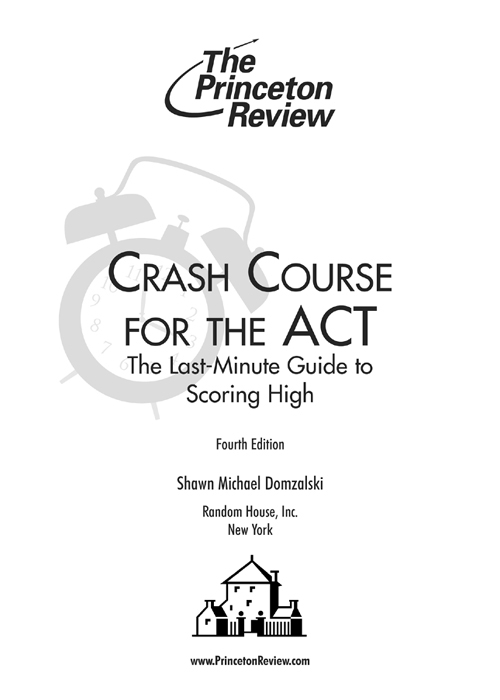The Princeton Review, Inc.
111 Speen Street, Suite 550
Framingham, MA 01701
E-mail:
Copyright 2012 by The Princeton Review, Inc.
Cover art GlowImages/Alamy.
The Princeton Review is not affiliated with Princeton University.
All rights reserved.
Published in the United States by Random House, Inc., New York, and
in Canada by Random House of Canada Limited, Toronto.
eISBN: 978-0-307-94471-9
Editor: Selena Coppock
Production Editor: Kristen Harding
v3.1
A CKNOWLEDGMENTS
I would like to thank my editor, Ellen Mendlow, for being so supportive and for asking me to work on this project (and many others), and Bill Lindsley, who encouraged me to focus my energies on learning all there is to know about the ACT and who has provided wise counsel on more than one occasion. And thanks to David Kwok for allowing me the time necessary to complete this project while working in The Princeton Reviews LA office as well.
Thanks to Chris Dent for his careful revision of this book.
Also, thanks to the fine folks at ACT in Iowa City, without whom there would be no ACT.
Special thanks to Adam Robinson, who conceived of and perfected the Joe Bloggs approach to standardized tests and many of the other successful techniques used by The Princeton Review.
Finally, thanks to Danielle, for the love, the support, the strength, and the friendship. You rock.
C ONTENTS
Orientation
WHAT IS CRASH COURSE FOR THE ACT?
Crash Course for the ACT is the book to buy if you dont have a lot of time to prepare for the ACT and want to spend what little time you have as wisely as possible. Simply put, this is a focused review of what you need to know for the ACT. The techniques and drills contained in this book are all intended to help raise your score. This is not a comprehensive review of the ACT; for that, you should get The Princeton Reviews Cracking the ACT.
WHAT IS THE ACT?
The ACT is a standardized exam used for college admissions. Every year, it is administered to more than one million college-bound students just like you. You can take the test in September, October, December, February (in all states except New York), April, or June. Colleges use the test to evaluate your likelihood of succeeding in college. Unfortunately, the test does a lousy job of showing how well youll do in college. It also does not measure your intelligence. Ultimately, the only thing the ACT shows is how well you do on the ACT.
The structure of the ACT is always the same. Whether you take it in New York City in October or in St. Louis in December, youre going to see the following tests in the following order:
- a 45-minute English test with 75 questions
- a 60-minute Math test with 60 questions
- a 35-minute Reading test with 40 questions
- a 35-minute Science test with 40 questions
- an optional 30-minute Writing test with 1 essay prompt
English
The English test will have five passages in it, each with fifteen questions. The passages are pretty straightforward, and the questions contain a roughly even mix of questions on grammar or punctuation and on the style and content of the passage. The subject matter for the passages is completely unpredictable, but they are often written in the first person, as though the author were telling you a story.
Math
The Math test always is made up of the following questions:
- 14 pre-algebra questions
- 10 elementary algebra questions
- 9 intermediate algebra questions
- 9 coordinate geometry questions
- 14 plane geometry questions
- 4 trigonometry questions
These questions are arranged in a rough order of difficulty. The easiest questions do not come first, and the toughest questions do not show up only at the end. Although there is a general trend of increasing difficulty throughout the Math test, there are usually some easy questions among the final ten questions and some tough questions in the first half of the section.
Reading
The Reading test is made up of four passages, each with ten questions. They appear in the following order:
- prose fiction
- social science
- humanities
- natural science
Each passage will be roughly 8590 lines long. The prose fiction passage will be an excerpt from a novel or short story published relatively recently (usually something from the past twenty years, at most). The excerpts are frequently concerned with the authors ethnicity. The social science passage is usually a discussion of some aspect of our society. The humanities passage can be on just about any topic you can think of, from Japanese cabinet making to olive farming in Spain. The natural science passage is just what it sounds like, only there are usually no scientific figures accompanying the passage. Theres just reading in this test.
Science
The Science test contains three types of passages.
- 3 charts and graphs passages with 5 questions each
- 3 experiments passages with 6 questions each
- 1 fighting scientists passage with 7 questions
The passages in this section are on a variety of topics, including biology, physics, and earth science. What is absolutely crucial to remember is that you dont need to know anything about science to be able to do well on this part of the test (more on that later). The questions on the Science test do not come in any order of difficulty. There is also no order to the passages themselves. Your ACT may start with a charts and graphs passage, or it may not. You never can tell until you open it up.
Writing
The ACT Writing test will have one essay prompt, and youll have 30 minutes to craft a response. The prompt will define an issue and present two points of view on the issue; you will be asked to respond to a question by taking a position on either side of the issue. The topic will always be something the ACT test writers consider relevant to high school students. For instance, the ACT has asked whether high schools should institute peer courts to resolve disciplinary issues, whether asking teachers or looking at test results is the best way to assess student achievement, and whether having knowledge or communication skills is more important for a teacher to be effective. The strange thing about the Writing test is that it isnt a mandatory part of the ACT. When you register for the test, youll have to decide whether you need to take this part of the exam. Well talk more about that later.
Experimental Sections
Although the SAT routinely features an experimental section that is not counted toward your score, the ACT does not. Only in the June administration does the ACT contain an experimental section. This section will come at the end of the test (it will be section 5) and will be irregular in a couple of easy-to-spot ways. It will have an unusual number of questions. For example, if it is a Math test, instead of having 60 questions, it may have just 13. It will also last for a strange amount of time. For example, if it is an English test, it may last for 20 minutes instead of 45.
Frequently, the proctor of the exam will tell you that this section will not count toward your score. Whether or not you do well just doesnt matter. So why is it there? ACT is testing out new questions on you. If you feel like helping with this, great. Go ahead and do your best on the experimental section. If you dont feel like helping ACT with its little research project, then take a nap for 20 minutes. It wont matter at all.


